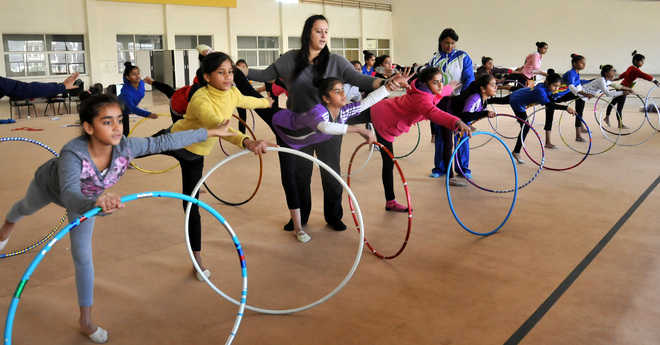
Greek rhythmic gymnastics coach Maria Baketea and Punjab Institute of Sports coach Neetu Bala training the girls in Mohali. Vicky Gharu
Indervir Grewal
Tribune News Service
Chandigarh, January 10
When Maria Baketea decided to come to India to conduct a month-long camp-cum-clinic for rhythmic gymnasts and coaches in Punjab, she had very little knowledge about the state of the sport in the country.
“I asked a gymnast friend whose husband worked in India. But she wasn’t much help,” said Baketea, who is an elite-level coach from Greece.
In fact, Baketea added with a smile, she had never heard of Punjab before the invitation from the Punjab Institute of Sports (PIS) and the Sports Department. Baketea took a leap of faith and travelled to India for the first time in her life. Now, after her month-long camp, which ended on Sunday, in Mohali, Baketea has made her assessment: “I can tell from their level and after talking to the coaches here that rhythmic is just starting in India.”
Artistic gymnastics has found reasonable popularity with the recent successes of Dipa Karmakar. However, the rhythmic version, in which only women compete, is still coming out of the shadows. It was only 10 years ago that the Indian federation (GFI) first made a concerted effort to popularise the sport.
“Rhythmic started getting separate attention only in 2005. GFI persuaded a few of us, who were artistic coaches, to shift to rhythmic. I became the first international rhythmic coach and judge from India. I even went to America for six months to learn,” said Neetu Bala, who is a PIS coach and has been in charge of organising the camp. “The Indian rhythmic team made its first appearance at the Commonwealth Games in 2006. Now, Indian gymnasts have made an appearance at the World Championships as well.”
Bala, who runs a centre in Amritsar, said that the discipline has seen considerable growth in the last 10 years. “Before 2005, rhythmic was not taken very seriously. Usually the artistic gymnasts also participated in the rhythmic events. In the beginning, I had difficulty convincing kids to take up rhythmic gymnastics. But now I have over 40 girls.”
But the discipline is still at a nascent stage. Bala said that most of the gymnasts in Punjab came from three cities — Amritsar, Patiala and Jalandhar. Despite that, Punjab has consistently been amongst the medallists at the national level. Bala, who has been the national coach since 2005, counted on her fingertips the other coaches who shifted to rhythmic along with her. It is clear that the states where these coaches set up their centres — Punjab, Maharashtra and Jammu and Kashmir — are now the leaders in the country. And to an extent, even now, the discipline is limited to these states.
Right first step
Baketea, citing Greece’s example, said that the process of making the sport popular takes time. “During my time, rhythmic wasn’t very popular. There were only two clubs in Athens. In the last 10 years, rhythmic has become hugely popular, not only in Greece but all over Europe. There are over 50 clubs in Athens now. Every girl in Greece does rhythmic for at least a year,” said Baketea, who was a gymnast for 10 years before becoming a coach. This is a big year for Baketea as one of her trainees has qualified for the Rio Olympics.
Punjab organising this camp, she said, is only the first step, one which Greece took 30 years ago.
“At that time, we had similar clinics being organised regularly. Coaches from Bulgaria, one of the leaders in the sport, came to Greece to teach our coaches. And then some of our coaches went there to learn. Similarly, Punjab should organise these camps at least twice a year,” she said.
Bala said: “There have been such camps organised in other states. But this is the first time when the kids didn’t have to pay a fee. So, it’s a great initiative. I can see the day when there are centres all over the state and Punjab rising to the top, because we have a lot of potential.”
Baketea agreed with Bala, saying: “There are five-six exceptional girls with huge potential.”
Punjab’s dominance and the potential for growth were the reasons why PIS decided to hold a camp for rhythmic and not artistic gymnastics.
‘Elbows straight’
However, Baketea, a coach for the last 13 years, pointed out some key areas that needed big improvement.
“The basics of these coaches are not strong,” she said during a training session, before shouting to the girls: “Elbows straight, or you will have to do it again!” The girls were doing an exercise holding gymnastics clubs.
“They don’t teach the right technique at the right age. The discipline level is not where it should be; the first thing I told the coaches was to organise their training. The gymnasts here train for two-three hours a day. But you have to train for at least five hours. I repeatedly stressed on the fact that they don’t work on strengthening, especially of the core muscles. Also, they are not in sync with the modern techniques.”
Baketea, however, said that she understood why this was the case. NIS offers a one-year course, which is the same for rhythmic and artistic gymnastics. “It is one of the toughest — physically and mentally — and complex sports. You can’t become a coach in one year,” said Baketea, who did a five-year course from the National Sports Academy in Bulgaria, the leading institute in the world, and a three-year master’s degree from Greece.
“In Greece, someone without four years of education, specifically in gymnastics, is not allowed to train the kids unsupervised.”
Baketea added that the younger girls needed more international exposure, at least two tournaments in a year. She said that she was willing to organise a training camp for the brightest girls at her academy in Athens and coordinate their participation in a tournament there.
That might not happen in the near future, but the coaches and gymnasts are not complaining. They are grateful that Baketea made her leap of faith. And Baketea, who has formed a strong bond with the 30-odd girls, is willing to make the trip again anytime in the future.



























